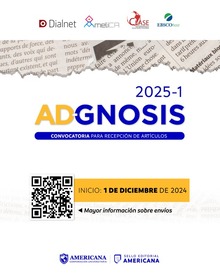Characterization of soft skills as an academic and organizational management tool
DOI:
https://doi.org/10.21803/adgnosis.13.14.783Keywords:
Competence, Organizational context, Strategies, Soft skills, Added valueAbstract
Introduction: Functional organizational management
in many cases is affected by serious difficulties in the
emotional management of the collaborators that make
up this fabric. For this reason, today's organizational
leaders are becoming aware of the need to deepen the
suitability of those linked to their companies, for this
reason, early characterization of individuals is a functional strategy to ensure such profiles. Objective: To design an instrument that allows early characterization of soft skills as an academic and organizational management tool. Methodology: This paper has been carried out from a quantitative descriptive, non-experimental, field approach,
with convenience sampling. Results: The findings of the
design of the instrument aligned to the competencies with their respective raw scores are presented are as follows: systems and investigative thinking 7, creativity and innovation 9, empathy 9, entrepreneurship 8, flexibility 10, integrity 6, multitasking 7, critical thinking 6, technology 7, effective teamwork 10, inspiring vision 10, and overall average 8.1. Conclusions: The designed proposal allows harmonizing soft skills in a structured way generating value for future applied research.
Downloads
References
Antequera Amaris, R. R., Ramírez Molina, R.I., Santamaria Ruiz, M.J., y Lay Rabyb, N.D. (2022). Generic and technical skills of human talent supported by ICT: systematization, scope, and reflections. Procedia Computer Science, 210, 378-382. https://www.sciencedirect.com/science/article/pii/S187705092201625
Cabrero, B. G. (Noviembre-Diciembre de 2018). Las habilidades socioemocionales, no cognitivas o “blandas”: aproximaciones a su evaluación. Obtenido de Revista digital Universitaria: http://doi.org/10.22201/codeic.16076079e.2018.v19n6.a5
Castro, A. (2015). Comportamiento multitarea e implicaciones neurocognitivas. Obtenido de neuropsicologíahuc.com.ve: https://www.neuropsicologiahuc.com.ve/seminarios/Comportamiento%20multitarea.pdf
Chiavenatto, I. (2000). Administración de Recursos humanos. Bogotá: McGraw-Hill. Quinta edición.
Congreso de Colombia. (2009). Gestor Normativo. Obtenido de https://www.funcionpublica.gov.co/eva/gestornormativo/norma.php?i=36838
DELITO, O. D. (2019). INTEGRIDAD Y ÉTICA. Obtenido de https://www.unodc.org/documents/e4j/IntegrityEthics/MODULE_1_-_Introduction_and_Conceptual_Framework_-_Spanish.pdf
Gamero, M. G. (2019). Las habilidades blandas competencias para el nuevo milenio. Divulgare Boletín Científico de la Escuela Superior de Actopan.
García, M. d. (2020). Flexibilidad Cognitiva. Madrid: Down Madrid.
Goleman, D. (1995). La inteligencia Emocional. Buenos aires Argentina: Vergara Editorial.
Goleman, D. (1998). Emotional Intelligence. . New York: Bantam books,.
González, M., Encizo, B., Arciniegas, L., Tovar, P., Bonza, P., & Arévalo, L. (2020). IMPORTANCIA DE LAS HABILIDADES BLANDAS PARA LA EMPLEABILIDAD Y . Politécnico Grancolombiano.
Goodspeed, T. O. (2016). Desenredando la conversación sobre habilidades blandas. Interamerica dialogue.
Hernández Sampieri, R., Fernández Collado, C., & Baptista Lucio, P. (2014). Metodología de la Investigación (6a ed.). México D.F., México: McGRAW-HILL / INTERAMERICANA EDITORES, S.A. DE C.V. Recuperado el 05 de febrero de 2023, de https://www.uca.ac.cr/wp-content/uploads/2017/10/Investigacion.pdf
ICFES. (2016). Guia de orientación en competencias, Modulo Competencias ciudadanas. Bogotá : Ministerio de Educación Nacional.
Joshi, M. (2017). Soft Skills. BookBoon.
Luis Miguel Moreno Murcia, M. B. (2022). Formación en Habilidades Blandas en instituciones de educación superior: reflexiones educativas, sociales y políticas. Bogotá: Corporación Universitaria Minuto de Dios – Uniminuto.
Mackay, R., Franco, D., & Villacis, P. (2018). El pensamiento crítico aplicado a la investigación. Obtenido de chrome-extension://efaidnbmnnnibpcajpcglclefindmkaj/http://scielo.sld.cu/pdf/rus/v10n1/2218-3620-rus-10-01-336.pdf
María Alejandra Díaz Olmos, D. C. (noviembre de 2019). Habilidades Blandas que Revolucionan el Sector Tecnológico. Obtenido de revistas.unbosque.edu.co: https://revistas.unbosque.edu.co/index.php/RevTec/article/view/4089/3352
Murillo, J. T. (2019). Linea de tiempo y antecedentes: Habilidades Blandas y Felicidad. Obtenido de Universidad Simón Bolivar: https://www.studocu.com/co/document/universidad-simon-bolivar-colombia/ psicologia-general/linea-del-tiempo-y-antecedentes-habiliddes-blandas-y-felicidad/9360058.
Quispe, I. (2018). Repositorio Universidad Nacional de San Agustín Arequipa. Obtenido de http://190.119.145.154/bitstream/ handle/UNSA/8512/EDMpuquri. pdf?sequence=1&isAllowed=y
Rammert, W. (2001). La tecnología: Sus formas y las diferencias de los medios. Sripta nova: revista electrónica de geografía y ciencias sociales, 80.
Restrepo, L. (s.f.). https://sooypro.com/. Obtenido de https://sooypro.com/blog-de-orientacion-persona/que-son-las-habilidades-blandas/
Rodríguez, A. (2010). New perspectives for understanding business entrepreneurship. Obtenido de Pensamiento y Gestión: http://rcientificas.uninorte.edu.co/index.php/pensamiento/article/view/864
Sanchez M & Garcia, M. (2017). Satisfacción Laboral en los Entornos de Trabajo. Universidad Tecnológica de Pereira: Et Technica.
Torres-Flórez, D., & Pachón-Pérez, Y. (2021). Las competencias digitales en los profesores universitarios de las ciencias económico administrativas . Pensamiento Americano, 14(28), 77-93. https://doi.org/10.21803/penamer.14.28.447
Santamaria Ruiz, M. J., Ramírez Molina, R. I., Antequera Amaris, R. R. y Lay Raby, N. D. (2022). Types of competencies of human talent supported by ICT: Definitions, elements, and contributions. Procedia Computer Science, 210, 368-372. https://hdl.handle.net/11323/9644
Santamaria-Ruiz, M., Ortíz-Morales, M., Benavides Morón, E., Vargas-Suarez, E., & Troncoso-Palacio, A. (2023). An analysis of management by competencies in grocery retail distributors. Procedia Computer Science, 224, 431-436. https://doi.org/10.1016/j.procs.2023.09.060
UNESCO. (2021). Competencias y habilidades digitales. Obtenido de https://unesdoc.unesco.org/ark:/48223/pf0000380113
Zambrano-Chamba, M., Vallejo-Piza, G., & Tafur-Méndez, F. (2023). Investigación: habilidades blandas como complemento para la
formación profesional de los estudiantes. 593 Digital Publisher CEIT, 8(3), 257-267. https://doi.org/10.33386/593dp.2023.3.1627

Downloads
Published
Issue
Section
License
Copyright (c) 2024 AD-GNOSIS

This work is licensed under a Creative Commons Attribution-NonCommercial-NoDerivatives 4.0 International License.





